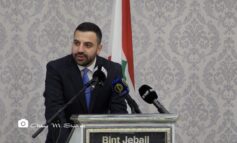The explosion of September 19 targets the Christian community in Lebanon. The Christians of this country have become a demographic minority over the last few decades as a result of higher emigration and smaller families. They have emerged from a devastating 15-year civil war with less political power but with determination to retain political advantage. They are assigned by tradition the presidency of the republic and the position of chief of army. They have naively situated themselves for cyclical political scapegoating.

|
| Political killing in Lebanon is serial. It is maddening. There seems to be no cure for it. |
The explosion that killed seven Lebanese and injured twenty others in a Beirut suburb this week is a stark reminder that the country is in deep trouble. There is a political vacuum as a result of the conflict surrounding the Lebanese presidential elections. In less than a week the parliament is expected to elect the next president.
Local politicians are crippled as Iran and the U.S. battle each other politically in Beirut over the future of Hizbullah and Tehran’s nuclear program. Washington is also after Damascus in pressuring Beirut to push hard for the international investigation of the murder of former Prime Minister Hariri. Time is running out for a smooth election.
In Lebanon, explosions are the language of hidden enemies, enemies without a cause. The enemy should not be confused with the opposition. The opposition to the ruling coalition has been transparent and peaceful so far. However, its massive downtown sit-in strike has hurt the economy badly.
This week’s crime may be related to an event in the recent past. In May of this year a group of renegade fighters, who call themselves Fateh al Islam, murdered a battalion of Lebanese soldiers and subsequently fought with the national army for four months in a Palestinian camp. The army had a hard time terminating this mini insurgency but it finally defeated the fanatic rebels. But some of the members of this gang are still on the loose. They could have been behind the September 19 murder. Intelligence work has revealed that Fateh al Islam last year killed Pierre Gemayel, a cabinet member, in a similar massive car explosion.
Perpetrated in a Christian neighborhood and aimed at a notable Maronite parliament figure, this latest murder was a familiar message of political hate. The Christian response to this act of fanatism demands inspiration, discipline, reflection and stretched tolerance.
Christians in Lebanon are divided and their politics do not reflect much learning from the civil war. Their political personalities have not changed much. Their leaders claim to be secular and modern and yet they rush to Bkirki, the seat of the Maronite Patriarchy, seeking church based solutions whenever they face a crisis. Their insistence on keeping the presidency of the country is neither serving them nor the country. Leading the nation in an anti-Syrian campaign is not wise. Strategically, Syria needs to remain emotionally close to Lebanon, despite its political mischief in Beirut. Too many Christians are politically sympathetic to the U.S. and culturally wedded to Europe while the Muslim world is going through a very painful and humiliating experience with the West.
Despite the fact that Christians are on both sides of the conflict in the presidential elections, the policies and practices of the U.S. in Lebanon and the rest of the region make all the Lebanese Christians weaker. There is nothing Christian about U.S. strategic politics but Arabs today increasingly look at Americans as modern time Crusaders. Washington and Tel Aviv 2007-2008 shared war agendas may include Iran, Syria and Hizbullah.
In the past Arab Christian statesmen made great contributions as ideologues, as bridge makers with the West and as party leaders. Today, regrettably, in the context of the presidential elections, established Christian warlords are allowed to repeat the same rhetoric of the civil war. Minorities can not afford to be political slow learners in the Middle East.
With each electoral event Lebanon has faced a crisis. It is an indication that the system is unfair. This may be the last time that the president of Lebanon has to come from a designated sect. The country does not have to change the system radically. Rotating the presidency among the different sects may be an interim solution for the next stage of reform. If Christians initiate electoral reform they stand to gain respect and status and if they continue to ignore their social and cultural context they will be the primary losers.





Leave a Reply